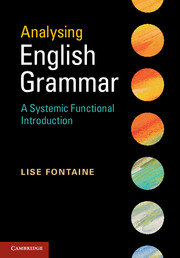Book contents
- Frontmatter
- Contents
- Preface
- Chapter 1 Introduction to functional grammatical analysis
- Chapter 2 The units of language analysis
- Chapter 3 The grammar of things: the nominal group
- Chapter 4 Representing experience
- Chapter 5 Orienting language
- Chapter 6 Organizing language
- Chapter 7 From text to clause
- Chapter 8 Guidelines for grammatical analysis
- Chapter 9 There and back again: interpreting the analysis
- Chapter 10 Answers to exercises
- Notes
- References
- Index
Chapter 5 - Orienting language
Published online by Cambridge University Press: 05 November 2012
- Frontmatter
- Contents
- Preface
- Chapter 1 Introduction to functional grammatical analysis
- Chapter 2 The units of language analysis
- Chapter 3 The grammar of things: the nominal group
- Chapter 4 Representing experience
- Chapter 5 Orienting language
- Chapter 6 Organizing language
- Chapter 7 From text to clause
- Chapter 8 Guidelines for grammatical analysis
- Chapter 9 There and back again: interpreting the analysis
- Chapter 10 Answers to exercises
- Notes
- References
- Index
Summary
INTRODUCTION
The previous chapter was concerned with exploring how speakers represent their experience through language. This included the various representations of processes, participants and circumstances and how these elements could be configured in meaningful ways. In addition to this, language also has a primary social function; how people interact through language. Most instances of language use will involve both experiential representation and personal interaction. These two functions tend to be so closely connected that it is very difficult to isolate them. In systemic functional linguistics, the main strands of meaning are considered to be created simultaneously. It is therefore artificial to separate the strands completely but we will pursue this and try to keep them isolated in the discussions here in order to gain explanatory power. It is easy to focus on the particular meaning associated to each strand of meaning as we consider each of the three main metafunctions in turn.
Having completed the presentation of experiential meaning in Chapter 4, this chapter concentrates on interpersonal meaning; the meanings created from the speaker’s personal ‘intrusion’ on the language situation (Halliday, 1978: 46) and how the speaker uses language to interact with others. This involves the means by which the speaker’s personal views are expressed, such as, for example, degrees of doubt, certainty, ability or obligation. In addition to these more personal meanings, speakers also express meanings that involve interaction more explicitly, such as asking questions, giving instructions or providing information.
- Type
- Chapter
- Information
- Analysing English GrammarA Systemic Functional Introduction, pp. 109 - 138Publisher: Cambridge University PressPrint publication year: 2012



